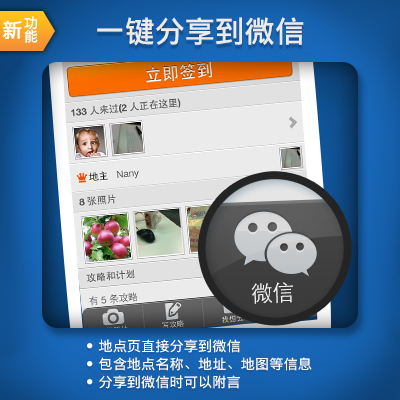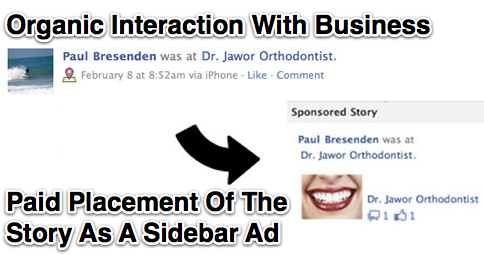We Are Social Asia Tuesday TuneUp #34
Jiepang buddies with Weixin
Jiepang.com, China’s largest location based check-in service announced its integration with the country’s biggest social media networking site Tencent. This allows users to log in using their Tencent account giving Jiepang access to a massive 700 million user pool. Check-ins can now be synced into all of Tencent’s social networking offerings such as QZone, Tencent Weibo, Pengyou and Weixin. The highlight of this integration is the leverage off Weixin(WeChat), a group chat service provided by Tencent. Weixin has over a 100 million registered users and more than 50 million active users, a rich opportunity to be tapped into for a location based service like Jiepang. What this means is that a check-in on Tencent Weibo will only take a couple of clicks to get that particular friend prompting him or her to drop by or as a notification if he or she is running late. The updated app also features a newly added function ‘What’s nearby’ which is said to challenge both Google and Baidu as a source for finding cool stuff in your area.
NonStop Games to bring Instagram and DrawSomething together
With OMGPop’s user numbers and sales dropping drastically, a drawing game might not be a safe bet for any studio. However, NonStop Games, a Singapore based Social Gaming start-up believes that the concept introduced in Draw Something was underdeveloped. Co-founder, Suuronen shares that the success of apps like Instagram and DrawSomething do not lie in the activity of taking photos or painting but rather in the social aspect that is nested in them. His insight into the real driver behind the popularity of Instagram is the aspect of having followers loving your work and commenting on them which motivates people to engage with app. The sentiment of coming back to the app and witnessing 10 likes and 20 new comments encourages people to keep drawing or posting photos. Leveraging off that insight, the team at NonStop introduced their newest creation Paint Stars as an interactive social gaming attempt. The app has already seen 30,000 pictures being painted everyday. While the concept behind making drawing social is inviting, whether or not people are ready for a replica of Draw Something remains a question mark.
China to recruit talent via its social media networks
As a matter of fact, China’s social media platforms are immensely popular, creating windows of opportunities for organisations to build their brand and market their products and services. Taking it further, human resource professionals are already using social networks for talent acquisitions, with up to 51% of all Chinese employers getting on board. This ranks higher than postings on newspapers, search engines and even higher than campus postings. Statistics on how Social recruiting is perceived as, as opposed to traditional means can be found here. While 75% of human resource professionals use Social media to keep in touch with active job seekers, it is noteworthy that 52% of employers are seeking opinion leaders and scarce talent. Also, 20% of them use it to screen candidates, which definitely puts extra pressure on avid social media users who are actively seeking for jobs.
Facebook tests new design and wording changes
With Facebook’s News Feed becoming more activity-based through Pinterest pins, articles read and Spotify listens, users might not feel the same connection with their friends on the site. To optimise user engagement, Facebook regularly tweaks its features to make it more user friendly. Recently, it has been testing new designs with status updates as shown below:
It is also experimenting on encouraging users to update their status by showing the last time they updated and how many of their friends have recently logged in.
Facebook’s quickly woven into the Web’s DNA
Even if you’re not logged into Facebook, chances are you still see that little blue icon everywhere. Pingdom reports that almost half of the top 10,000 websites in the world have Facebook links, plugins or widgets on their homepages. Twitter isn’t too far behind at 42%, and Google+ has made up surprising ground in the short span of its existence, with 21.5% of the top sites including some kind of integration.
Mums are the queens of the Internet
Mothers are more likely to regularly use social media, have more than 200 friends on social networks and to ‘Like’ brands, according to the latest data from eMarketer and BabyCenter. This crowd of almost 28 million users is on the lookout for product reviews and advice from fellow mums.
eMarketer sets the scene:
You see the same scene in any neighborhood with young families: mom pushing the stroller with one hand, clutching her smartphone with the other. Through Pinterest, Facebook and other social media platforms, she is likely using that phone to connect or gather information online.
That moms are big-time social network users is demonstrated in study after study. eMarketer’s latest forecast shows that this year nearly 28 million moms will use social networks, representing a whopping 82% of mom internet users who have children under 18 in the household.
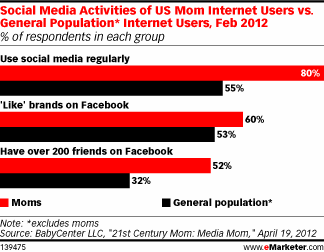
WOMMA updates social media disclosure guide, seeks public comment
The Word of Mouth Marketing Association has revised its disclosure guide, and it includes suggested status updates and hashtags for brand advocates (updated from just calling them bloggers). The group is seeking comment on the updates until Thursday.
Facebook tests off-site ads, hit by court ruling
Sponsored Stories, which appear when a user interacts with a page, have begun popping up on Zynga.com, the popular games platform that has long partnered with Facebook.
But Facebook is required to let users opt out of having their names, profile pictures and activity used in these sponsored stories, after a lawsuit settlement in California. However, it looks like users will have to opt out on a per-story basis, after the event, instead of being able to opt out of all sponsored stories in the future.
Is Facebook for branding but not for advertising?
Facebook’s profile as a viable ad medium took another blow this week when Sir Martin Sorrell said he didn’t “think it is necessarily an advertising medium”. Sorrell, the head of marketing giant WPP, did say however that Facebook is “one of the best branding mechanisms in the world”. WPP accounts for 5% of ads running on Facebook, so you could say his right hand isn’t talking to his left.
As if Facebook could hear Sorrell speaking to The Guardian, Facebook has called on some creativity from outside its four walls, and created a new creative council. It gathered the chief creative officers from agencies across the world to sit down and talk about how to make Facebook advertising better at the Cannes Lions ad festival.
Facebook brings back comment editing and introduces new hover cards
Pushed enter too quickly? Facebook users can edit comments as many times as they’d like. The change appears with an “edited” tag next to the comment’s ‘Like’ button, and all users can see a change log for the comment. Facebook has also updated “hover cards”, which pop up when users hold their mouse over page and user names. The new text is white over the cover photo, which could be problematic for some pages with light-coloured cover photos.
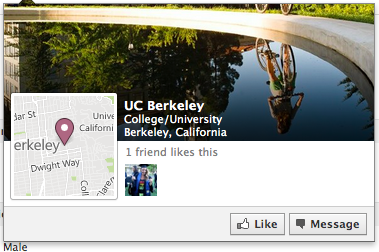
Facebook takes full ownership of the ‘Like’, Face.com and subscription billing
The network has given mobile app developers 90 days to reroute their app’s ‘Like’ function to Facebook’s, meaning that developers can no longer have their own ‘Like’ action within mobile apps using the Facebook API. The new functionality is good though – in Instagram’s integration, a friend can like your photo on Instagram and you are notified of it on Facebook.
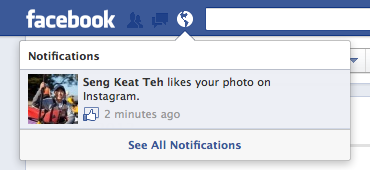
Facebook has acquired facial recognition company Face.com for a reported $100 million in another effort to become the one-stop photo-sharing platform. The company’s claims its technology can guess which friends appear in your photos, as well as their age, gender and mood (it should be noted Facebook already licences this technology so the acquisition will make no immediate difference to Facebook’s functionality). In another recent move, Facebook has backed away from virtual currencies in favour of real currency for games and other apps, similar to paying for an app on Google Play or the iTunes App Store.
Twitter revamps how readers see the conversation, introduces ad products
Want to see what brands, athletes and musicians are posting but not their conversations? Twitter is rolling out a feature for verified accounts that lets users see just original tweets or @replies. Twitter’s also expanding its borders with theintroduction of ad products to 50 new countries by the end of 2012. The main targets are Brazil, Spain and Germany, which will be able to purchase promoted tweets, trends and accounts. Twitter’s CEO confirmed that these kinds of promotions, not large display ads on the site, were the way forward (and the way to profit) for Twitter.
But it’s not like we even needed proof that the globe is having its conversations on Twitter, as shown in this stunning visual from the England vs. France Euro 2012 match, with England supporters in red and France supporters in blue. #Euro2012 also just got its own customised hashtag page, similar to NASCAR’s.
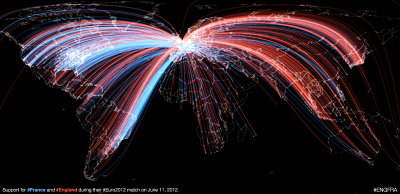
Targeted status updates come to LinkedIn
Business pages can now filter updates to send just to certain industries, seniority titles, job functions, company sizes, non-company employees and regions, making it a bit similar to Google+ Circles or Facebook Lists. Some businesses that were part of LinkedIn’s trial run have already reported higher engagement with their targeted posts.
Google+ integrates with Flipboard
Flipboard users can now add their Google+ streams to the “king of social news readers”. What does this mean for Currents, Google’s own social news reader? Flipboard could spell its death, but it’s a good move for Google if they want more content from Google+ to be seen. Google’s Bradley Horowitz highlighted that Google wanted to get to know its 170 million users better, and having good relations with app developers will certainly help that mission.
Habbo Hotel’s fans make their voices heard
Although the platform is still reeling from the sexual predator scandal last week,Habbo’s loyal users have made themselves known on social media, directly tweeting Channel 4 their thoughts and experiences. Habbo even temporarily opened a public forum where users could speak their minds on one of three questions posed by Habbo’s CEO about the importance of the community and how they could improve the site. However, it still isn’t clear what will happen next as the aftermath of the scandal is still unfolding.
Want to become an Olympic athlete? Tell your Facebook friends
2012 is quickly becoming the Year of the Social Exercise app, and HealthyShare, debuted by Facebook and GE, has just jumped into the arena in time for the Olympics. Add your fitness and health goals to your Facebook Timeline, and friends will cheer (or boo) you on, depending on how your New Year’s resolution is going.
Unilever makes friends with Facebook on WaterWorks project
Unilever’s charitable contributions had a huge boost last year with the launch of its Sustainable Living plan, a project to bring safe drinking water to 500 million people. This has not been a social campaign so far, but that has changed as the consumer brand is hitting up Facebook’s 900 million global users for help by launching a Facebook app where they can donate between 10 euro cents and €1 daily via Facebook credits. In return, donors will see updates from the aid workers and the people and villages they help.
P&G hosts ‘Thank-a-Thon’ for its 1 million Facebook fans
It’s the big brand milestone on Facebook, and they are keeping it personal and creative. To celebrate P&G’s first million, its employees across the company said “thank you” for 30 hours and 48 minutes straight via video stream and encouraged fans to interact with them on Facebook and Twitter.
Evian doesn’t serve well in its Wimbledon campaign
Wimbledon had a great start this week, and many brands have been busy looking for links it can make to the competition. One such brand is Evian, the official water of the tournament. Evian UK launched a competition for its 119,500-odd Facebook fans to win exclusive tickets to watch the tennis. Over the last week, Evian’s ball boy left clues of his London whereabouts on Facebook and Twitter, and a follower who found him was chosen at random each day. Given Evian’s huge social presence, the campaign has been criticised for the seeming lack of engagement on its social profiles, averaging about 25 likes per post, made even more surprising by the fact that Evian has been running marketing since 14th June. The actual results are not quite yet in, but this is certainly one to watch.
Panasonic tests Pinterest for its latest competition
The camera company partnered with PureWow, an e-mail media firm, to launch a typical “Photo of the Year” contest, but then took the top 20 photo submissions and put them on Pinterest, Facebook and a web photo slideshow to find the winners. One of the two winners would be chosen by getting the most re-pins on Pinterest. The early results are impressive. In two weeks, more than 10,000 photos were submitted, and Pinterest is now the third highest traffic source for PureWow. One of PureWow’s posts has been repinned more than 40,000 times.
Tweets for teas
The beverage company BOS has developed the first vending machine that dispenses drinks when a customer tweets a hashtag while standing in front of the machine. The machine is connected to Twitter’s Streaming API, so even if you tweet using the hashtag but are outside of a certain radius, there will be no tea for you.
Nike is the first UK company to have its Twitter campaign banned
The line between paid-for, sponsored and personal tweets can be blurry, and the ASA has riuled said that tweets from footballers Wayne Rooney and Jack Wilshere weren’t clearly labelled when they contained Nike-branded content without an #ad tag. As our very own Robin Grant said:
The ASA has made some questionable decisions recently which call into question its ability to properly regulate social media campaigns.
It ruled that AMV’s Snickers campaign didn’t break the CAP Code when it clearly did and, in this instance they’ve ruled against Nike, when it could quite reasonably be argued that Wayne Rooney’s tweets did not fall within its remit.
This is bad news for everyone, as incompetent and inconsistent regulators are in neither the industry’s or the public’s best interests.
Femfresh removes its page from Facebook after backlash
Asking ladies on Facebook whether they call their vaginas “hoo haas” or “lady gardens”is not the way to win friends, as Femfresh has discovered over the past week.Femfresh finally pulled its page after loads negative comments came in, instead of addressing them and redirecting the campaign.
A Stephen Colbert tip of the hat to @Sweden?
In a surprise twist from last week’s story about the @Sweden account, this week finds us wondering whether Sweden will hand over control of the country’s official Twitter account to one of America’s greatest comedians. Apparently it’s actually being discussed, and Colbert should find out in the next week. The Twitter account won the Grand Prix award at the Cannes Lions International Festival or Creativity on Wednesday for “best international viral marketing campaign”.
Smart Cars have a smart reply for a critic
After ad critic Clayton Hove tweeted, “Saw a bird had crapped on a Smart Car. Totaled it”, Smart Car brewed up a brilliant infographic about just how many bird craps of various sizes it would actually take to total one.
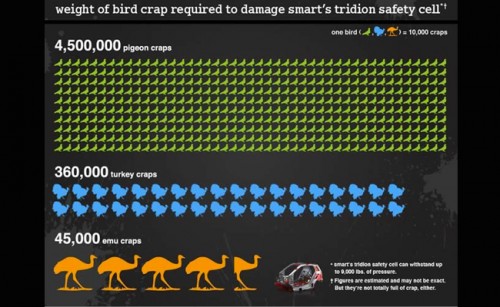
VisitEngland just won Euro 2012
During last night’s disappointing match against Italy, it seemed like England’s National Tourist Board scored more than the team as they fired off one-liners like a standup comedian. The best tweet of the night had to be when Italy scored the third penalty kick.
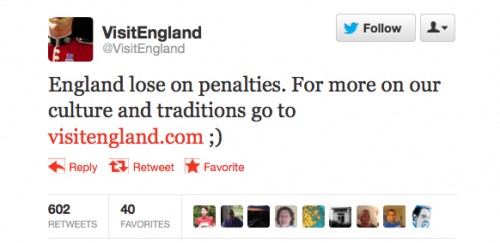
But NatWest isn’t @NatWest…
An angry mob of NatWest customers took to Twitter after a computer glitch at the bank stopped transactions from going through, but their frustrations were accidentally directed at a 22-year old teacher named Natalie Westerman who goes by @NatWest on Twitter. She said she “never felt so popular in my life”, and she’s been kindly sending them on to the correct Twitter handle, @natwest_helps.
